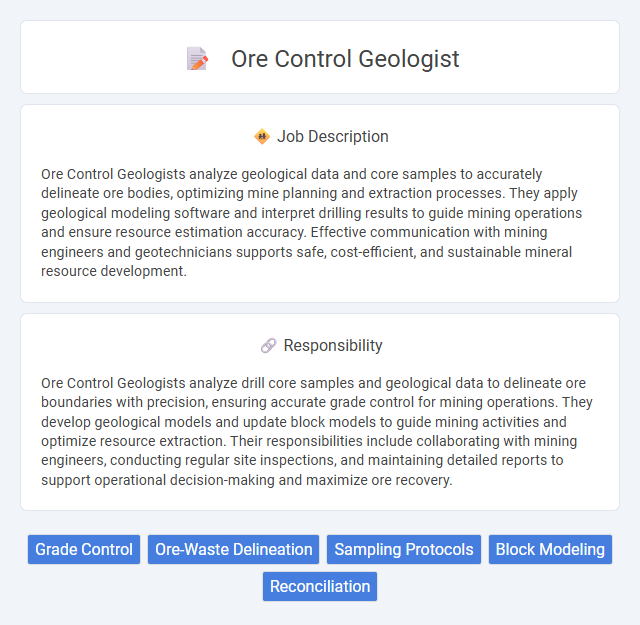
Ore Control Geologists analyze geological data and core samples to accurately delineate ore bodies, optimizing mine planning and extraction processes. They apply geological modeling software and interpret drilling results to guide mining operations and ensure resource estimation accuracy. Effective communication with mining engineers and geotechnicians supports safe, cost-efficient, and sustainable mineral resource development.
Individuals with strong analytical skills and attention to detail are likely well-suited for the Ore Control Geologist role, as it demands precise interpretation of geological data and monitoring of mineral deposits. Candidates comfortable working in dynamic field environments and collaborating with mining teams may find this job particularly fitting due to its hands-on nature and the necessity for effective communication. Those who prefer routine tasks or lack resilience in physically demanding situations might face challenges adapting to the role's dynamic and sometimes high-pressure conditions.
Qualification
Ore Control Geologists require a bachelor's degree in geology, mining engineering, or a related field, often supplemented by certifications such as a Professional Geologist (PG) license. Expertise in ore deposit modeling, geological mapping, and grade control software like Datamine or MineSight is essential. Strong analytical skills and proficiency in interpreting drill core data, seismic surveys, and geostatistical analysis enhance accuracy in resource estimation and mine planning.
Responsibility
Ore Control Geologists analyze drill core samples and geological data to delineate ore boundaries with precision, ensuring accurate grade control for mining operations. They develop geological models and update block models to guide mining activities and optimize resource extraction. Their responsibilities include collaborating with mining engineers, conducting regular site inspections, and maintaining detailed reports to support operational decision-making and maximize ore recovery.
Benefit
An Ore Control Geologist likely enhances mining project efficiency by accurately mapping ore boundaries and reducing resource waste. The role probably contributes to increased profitability as precise geological data guides optimal extraction plans. Effective ore control may also improve safety by identifying geological hazards early in the mining process.
Challenge
The role of an Ore Control Geologist likely involves the challenge of accurately interpreting complex geological data to optimize mineral extraction and minimize waste. Ensuring precise mapping and sampling within fluctuating ore bodies might require advanced analytical skills and constant adaptation to evolving mining conditions. The position probably demands balancing technical accuracy with tight operational deadlines, presenting ongoing hurdles in extraction efficiency and resource estimation.
Career Advancement
Ore Control Geologists play a critical role in mineral exploration and mining operations by interpreting geological data to guide efficient ore extraction. Mastery in geostatistics, software like Micromine or Surpac, and hands-on experience with blast design and sampling significantly enhance prospects for promotion to senior geologist or mine planning roles. Continuous skill development, professional certification, and cross-disciplinary collaboration accelerate career advancement in this specialized field.
Key Terms
Grade Control
A Grade Control Ore Control Geologist plays a critical role in mining operations by analyzing and interpreting geological data to accurately determine ore grades and boundaries. They implement sampling protocols and use software tools to optimize resource estimation, ensuring efficient extraction and minimal dilution. This position requires expertise in geostatistics, drill hole data management, and close collaboration with mine planning teams to support production targets.
Ore-Waste Delineation
Ore Control Geologists specialize in ore-waste delineation by analyzing geological data to distinguish ore bodies from waste rock with high precision. Utilizing advanced geostatistical methods and geological modeling software, they optimize resource modeling to enhance mining efficiency and reduce operational costs. Their accurate block modeling and grade control techniques significantly improve ore recovery rates and ensure compliance with mining regulations.
Sampling Protocols
Ore Control Geologists implement rigorous sampling protocols to ensure accurate assessment of mineral grades within mining operations. They design and oversee systematic sampling methods, including chip, channel, and drill core sampling, maintaining precision in sample collection to minimize contamination and bias. Their expertise in data validation and QA/QC procedures directly influences resource estimation and operational decision-making.
Block Modeling
Ore Control Geologists specialize in creating accurate block models by integrating drilling data and geological information to delineate mineral boundaries and optimize resource estimation. Their expertise in interpreting assays and lithological data ensures precise grade control for efficient mine planning and extraction. Advanced software skills in tools like Datamine or Micromine improve the reliability and spatial accuracy of block models essential for maximizing ore recovery.
Reconciliation
Ore Control Geologists specialize in ensuring the accuracy of mined ore volume and grade through detailed reconciliation processes. They analyze mineral samples, compare actual extracted ore with production plans, and adjust geological models to optimize resource extraction. Precision in ore reconciliation minimizes financial discrepancies and maximizes operational efficiency in mining projects.
 kuljobs.com
kuljobs.com